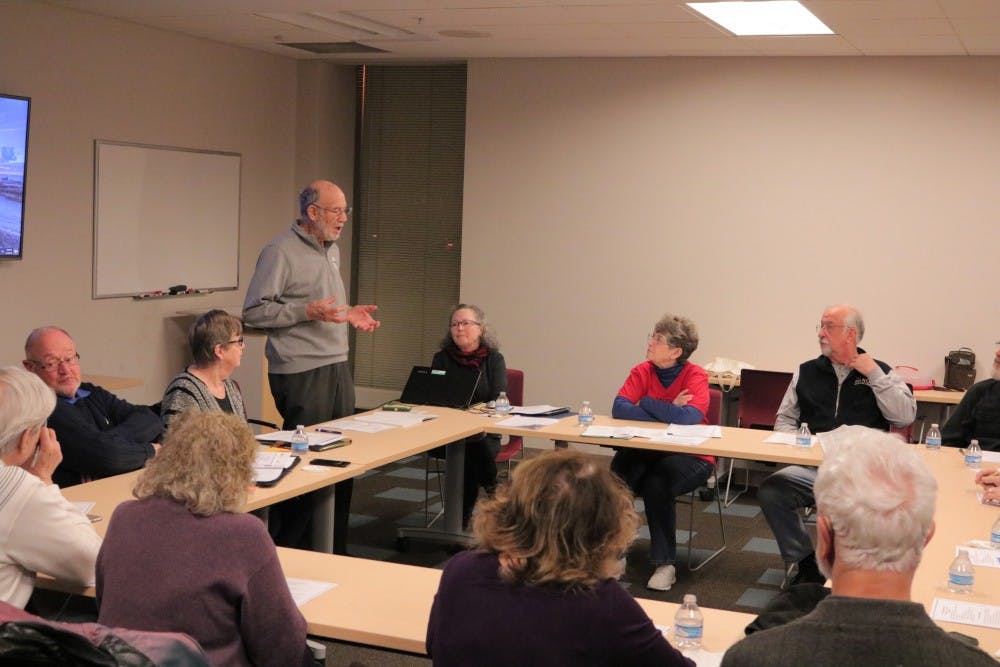The Redistricting Network, a coalition of several Monroe County organizations, met Thursday night at the Monroe County Public Library to discuss the next steps in its mission to convince legislators to pass redistricting reform.
“The theme tonight is network building,” Redistricting Network member George Hegeman said.
He wore a sticker on his shirt showing a purple, spotted salamander with the words “Is the gerrymander eating your vote?” circled around it.
Gerrymandering, which has been an issue for most of the United States' history, is the drawing of district lines by a particular party to establish a political advantage.
State lawmakers currently draw the lines of Indiana’s legislature districts. Coalitions like the Redistricting Network want lines to instead be drawn by citizen commissions, which would in turn prevent gerrymandering.
James Allison, co-founder of Reverse Citizens United, one of the organizations involved in the Redistricting Network, said both parties have been involved with gerrymandering.
“This is a nonpartisan issue because it is warfare against the voter,” Allison said. “It’s a conflict between the state legislature that draws these lines and does the gerrymandering, and the voters that are deprived of representation.”
New districts for the state legislature are drawn every 10 years, after the U.S. census takes place. The next redistricting will occur in 2021. State coalition All IN For Democracy, led by national organizations including the League of Women Voters and Common Cause, are pushing Indiana to pass a redistricting reform bill to form a citizen redistricting commission by the end of the 2019 legislative session.
Several states including Michigan, Missouri, Colorado and Utah have succeeded in creating redistricting reform through citizen referenda. Indiana law does not allow citizen referenda, which means reform must be passed through the state legislature.
“We have to pressure our legislators personally and tell them what we want and why we want it,” Allison said. “We’re going to try to shame them by pointing out that if they do it the old way, this violates the constitution.”
Susan Davis, a member of the Redistricting Network, said the urgency lies in the prospect of another decade of underrepresentation because of gerrymandering.
“This is stopping all of us from solving the issues we’re dealing with,” Davis said. “Whether the issue is health care, environment, wage issues, education, they can’t get anywhere because there’s a supermajority in Indianapolis.”
During the meeting, Redistricting Network members encouraged attendees to stand outside elections committee hearings on Mondays and Thursdays at the Indiana Statehouse with signs to serve as a visible reminder for state legislators.
The main bill that redistricting reform coalitions in Indiana are supporting is Senate Bill 91. The bill would establish a nine-member citizens redistricting commission consisting of members of both parties and independents.
The first step of the bill getting through the legislature is to get a hearing for the bill in front of the elections committee. The members of the committee decide if the bill will advance to a full Senate vote. Last year, a redistricting reform bill had three hearings in the elections committee but never was voted to go to the House floor.
Redistricting Network member Vickie Dacey, who was at last year’s committee hearings, said redistricting reform is advancing, even if it’s slow. There are currently six redistricting reform bills in the state legislature for the 2019 legislative session, but each have yet to be given a hearing in the senate or house elections committees.
“It’s the wave of the future,” Allison said. “It should be plain to anybody. This is what’s going to happen eventually, the question is when is it going to happen in Indiana? Are we going to be the last one in the union to do it? Other states are waking up, it’s time for us to wake up.”




